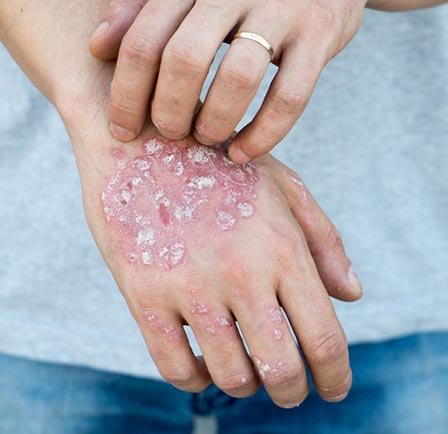Psoriasis is a common, chronic skin disease which sometimes also involves nails and joints. It affects up to 2% of the world population. Psoriasis is not a life threatening disease but recurrences are common. Psoriasis is a disease which is treatable and can be effectively controlled but is not completely curable.
Psoriasis presents as well demarcated, elevated, scaly, reddish, itchy skin lesions mainly on outer aspects of upper & lower limbs, palms & soles and scalp. Trauma prone areas of skin are more commonly involved. It may sometimes involve the nails and joints.
The exact cause of Psoriasis is not known. It is a complex interplay between genetics and immuno- logy.Genetic susceptibility and environmental factors are responsible for disease.

Normally the epidermis or outer layer of skin is continuously replaced and it takes place within three and four weeks. There is increasedturnover of skin cells in Psoriasis so that the skin cells are formed and shed within a week.
Some More Questions
Psoriasis is not contagious. It cannot be caught from touching someone who has the condition, swimming in the same pool, sharing towels, or eating food prepared by a person with psoriasis.
Many factors are known to aggravate Psoriasis. Infections – sore throat and HIV infection can trigger Psoriasis. Certain medications such as antihypertensive drugs (beta-blockers), anti-malarials (chloroquine), pain killers, medications for psychiatric illnesses (lithium) and withdrawal of systemic corticosteroids can aggravate Psoriasis. Physical trauma and mental stress can trigger Psoriasis. Cold climates and winters commonly aggravate Psoriasis in most cases, but some patients may have summer aggravation. Alcohol intake and smoking can aggravate the disease. Obesity and decreased physical activity are well known aggravating factors for Psoriasis as well as other co-existing diseases with Psoriasis
The treatment of psoriasis should be individualized and depends on patient and disease factors. Treatment is concerned with control rather than cure. Psoriasis can be managed with sustained judicious use of various treatments.
- Psoriasis can be treated by topical medicines, phototherapy and/or systemic drugs depending upon the severity of the disease.
- Regular use of moisturizers and managing the aggravating factors play an important role.
- All medications should be taken under the supervision of a dermatologist and proper follow up with maintenance treatment is mandatory.
Diet is thought to play only a small role in psoriasis. In general, a well balanced diet is advisable in people with psoriasis, just as it is in everyone.
Weight reduction to ideal body weight. Physical exercise. Limiting alcohol intake. Quit smoking. Biofeedback and cognitive behaviour therapy for reduction of stress level.
